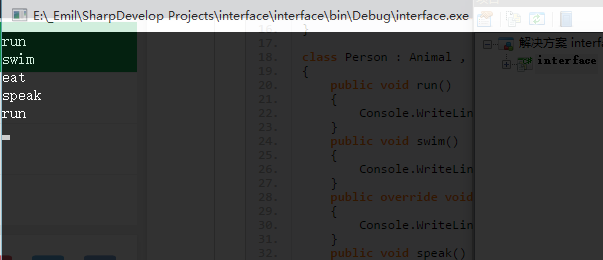接口(interface)
接口泛指实体把自己提供给外界的一种抽象化物(可以为另一实体),用以由内部操作分离出外部沟通方法,使其能被修改内部而不影响外界其他实体与其交互的方式。
接口实际上是一个约定:
如:IClonable, IComparable;
接口是抽象成员的集合:
ICloneable含有方法clone();
IComparable含有方法compare();
接口是一个引用类型,比抽象更抽象。
帮助实现多重继承:

接口的用处:
1.实现不相关类的相同行为,不需要考虑这些类的层次关系;
2.通过接口可以了解对象的交互界面,而不需要了解对象所在的类。例如:public sealed class String: ICloneable, IComparable, IConvertible, IEnumerable.
定义一个接口:
public interface IStringList //接口一般用I作为首字母 {//接口声明不包括数据成员,只能包含方法、属性、事件、索引等成员//使用接口时不能声明抽象成员(不能直接new实例化)void Add ( string s ) ; int Count{ get; } string this[int index] { get; set; } }//public abstract 默认,这两个关键词不写出来
实现接口:
class 类名 : [父类 , ] 接口, 接口, 接口, ..... 接口{public 方法 () { ...... }}
显示接口成员实现:
在实现多个接口时,如果不同的接口有同名的方法,为了消除歧义,需要在方法名前写接口名: void IWindow.Close(){......};
调用时,只能用接口调用: (( IWindow ) f ).Close();
接口示例:
using System;namespace TestInterface {interface Runner{void run();}interface Swimmer{void swim();}abstract class Animal //抽象类用作基类 {abstract public void eat();}class Person : Animal, Runner, Swimmer{public void run(){Console.WriteLine("run");}public void swim(){Console.WriteLine("swim");}public override void eat(){Console.WriteLine("eat");}public void speak(){Console.WriteLine("speak");}}class Program{ static void m1(Runner r){r.run();}static void m2(Swimmer s){s.swim();}static void m3(Animal a){a.eat();}static void m4(Person p){p.speak();}public static void Main(string [] args){Person p = new Person();m1(p);m2(p);m3(p);m4(p);Runner a = new Person();a.run();Console.ReadKey(true);}} }
运行结果:

含有同名方法的多个接口继承:
using System; class InterfaceExplicitImpl {static void Main(){FileViewer f = new FileViewer();f.Test();( (IWindow) f ).Close(); //强制转换,消除同名歧义 IWindow w = new FileViewer();w.Close();Console.ReadKey(true);} }interface IWindow {void Close(); } interface IFileHandler {void Close(); } class FileViewer : IWindow, IFileHandler {void IWindow.Close (){Console.WriteLine( "Window Closed" );}void IFileHandler.Close(){Console.WriteLine( "File Closed" );}public void Test(){( (IWindow) this ).Close(); //不同接口含有同名方法,需要在方法前面写接口名 } }

)














)


